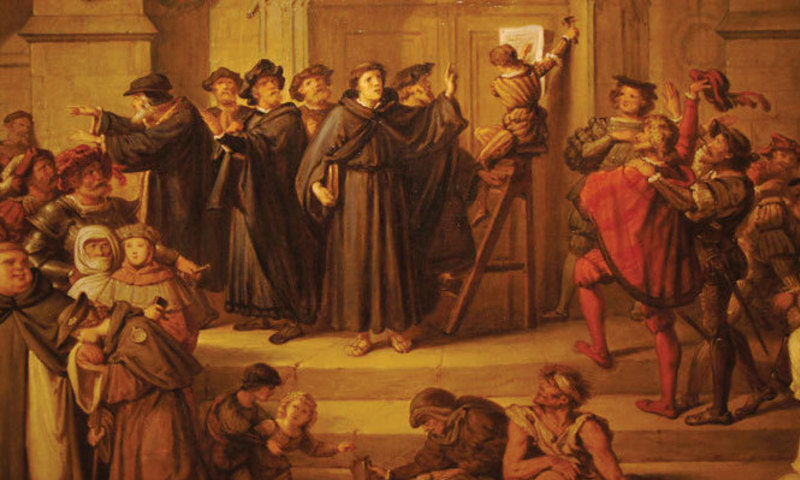Humphrey has come to stay at our house. Just for a spell, while our friends are on holiday. We have gotten to know Humphrey over the past two years, and he has stayed with us before. Though perhaps a smidgeon rounder than when our friends first got him, it is always the same gentle charm, the same squeaks, the same diet, the same inexplicable contentment in staying put. Humphrey remains as ever he was, a guinea pig.
Protestantism is not like a guinea pig. Not like Humphrey, at any rate. Protestantism has shown a breathtaking variety from generation to generation, country to country, continent to continent, culture to culture. Take a look at Mark Noll’s Protestantism: A Very Short Introduction (2011) or Alec Ryrie’s Protestants: The Faith That Made the Modern World (2017). If you were to make the acquaintance of a Protestant from an earlier century or from a distant country, there’s almost no telling what you might find.
Almost. For all the variety of Protestantism, we share a core identity. This identity was discovered by Martin Luther in the space of a few short years, and proclaimed with such prophetic power, exegetical clarity and deep pastoral insight that people across Europe began to recognize and adopt this identity as their own. The Protestant movement was born.
What is this Protestant identity? It should go without saying that a Protestant is first a Christian. Mere Christianity involves beliefs such as expressed in the Nicene Creed and practices such as prayer and preaching, baptism and the Lord’s Supper, evangelism and care for the poor. Like Luther, many of those who became Protestants had been Christians before (however confused they may have been) and they remained Christians after. The Reformation was not creation out of nothing.
Mere Protestantism is a subset of mere Christianity. Within basic Christianity, Protestant identity involves its own defining set of beliefs and practices. There are three of these in particular. They were there from the earliest years of the Reformation, and they have continued to give a coherent identity to the sprawling Protestant movement as a whole. These three center on salvation, the Bible and ministry.
I. Salvation
First and foremost, salvation. More than anything else, what Luther wanted was salvation. Luther was a devout monk. He was absolutely serious about his relationship with God. And he believed that he had to be good enough to deserve God’s approval.
It wrecked him. Luther was far too keenly aware of his own sinfulness to suffer any illusions of being good enough. Maybe you are, too. In fact, I pray that you are. What Luther discovered was grace. Through intense study of Scripture (Psalms, Romans, Galatians), Luther came to realize that we come in to God’s favor not by deserving but by believing. When we believe, Jesus becomes our “good enough.” We are justified by faith alone.
What an astounding discovery! Luther said, “Here I felt that I was altogether born again and had entered paradise itself through open gates.” For a conscience burdened by sin, what freedom! Luther proclaimed his discovery as The Freedom of a Christian (1520), one of his most brilliant treatises (and for a genius like Luther, that’s saying something). Protestants ever since have found themselves convinced of Luther’s exegesis and companions in his experience of God’s grace.
What exactly is the doctrine of justification by faith alone? The Heidelberg Catechism (1563) has remained one of the most widely used of the Reformation-era confessions. It gives one of the finest practical explanations ever written of the doctrine of justification. It has been a comfort to me as I’ve wrestled with the shame and frustration of sin in my own life.
It may prove a comfort to you as well. Question 60 asks, “How are you right with God?” (That’s normal-people speak for “What does the doctrine of justification by faith alone mean for you?”) Here’s the Heidelberg’s staggering answer:
Only by true faith in Jesus Christ. Even though my conscience accuses me of having grievously sinned against all God’s commandments and of never having kept any of them, and even though I am still inclined toward all evil, nevertheless, without my deserving it at all, out of sheer grace, God grants and credits to me the perfect satisfaction, righteousness, and holiness of Christ, as if I had never sinned nor been a sinner, as if I had been as perfectly obedient as Christ was obedient for me. All I need to do is to accept this gift of God with a believing heart.
Amazing. Maybe you should read that again. Maybe you should memorize it. That is the Reformation. That is Protestantism. In justification, God declares us righteous. He clothes us in the perfect righteousness of Jesus. We do not have “a righteousness of [our] own that comes from the law, but that which comes through faith in Christ” (Phil 3:9). The result is that God looks on us as if we had been as perfectly obedient as Jesus was! Justified saints still sin. We are still inclined toward all evil, and we suffer the accusations of conscience. But in that great counterintuitive “nevertheless” of grace, we also know the favor — indeed, the pleasure — of God. It comes by faith alone.
II. The Bible
Not everyone was convinced. In a “faith that was once for all delivered to the saints” (Jude 1:3), novelty is not a virtue. How could anyone be sure of so glorious a vision of salvation? Luther found that, in order to justify justification, he needed to say something equally bold about the Bible. This became the second defining belief of Protestantism.
The big showdown for Luther came in 1521 at the annual legislative assembly in Germany. Unfortunately for English-speaking Protestants, this event is known as the Diet of Worms. There, Luther was told to un-say what he had been saying about salvation. It did not agree with the church’s teaching at the time. In response, Luther pointed out that the various councils and theologians that had formed the church’s teaching “have often erred and contradicted themselves.” Therefore, he continued, “I am bound by the Scriptures that I have quoted, and my conscience is captive to the Word of God.”
Luther took the radical step of placing the authority of the Word of God over the authority of the traditions of the church. (If this seems like a no-brainer — Matthew 15:1–9! — it’s probably because we’re Protestant.) Justification sola fide (“by faith alone”) is authorized sola scriptura (“by Scripture alone”).
The Protestant Scripture principle, as it’s called, is not opposed to tradition. Protestants like tradition. We just like the Bible more. It’s true that some Protestants hold to “no creed but the Bible.” Others are happy to allow tradition to guide (but not govern!) our interpretation of the Bible — for example, the Augsburg Confession (Lutheran, 1530), the Thirty-Nine Articles (Anglican, 1571) or the Westminster Confession of Faith (Presbyterian, 1646). All of us affirm that doctrine and practice in the church must come ultimately from Scripture alone.
III. Ministry
Luther’s sapling vision of salvation needed soil to grow in: the supremacy of the Bible. It also needed a garden to fill: the ministry of the church. The third defining belief-and-practice of Protestantism is the priesthood of all believers.
If all Christians belong to a “royal priesthood” (1 Pet. 2:9), then we all have some priesting to do. So Luther declared To the Christian Nobility of the German Nation (1520). Ministry is not only something we passively receive from clergy, but also something we actively do as laity. Every believer is empowered by the Holy Spirit to contribute to the spiritual life of the local congregation (Rom. 12; 1 Cor. 12–14). Protestant priesthood means a laity active in ministry.
Just as the Scripture principle is not opposed to tradition, so the universal priesthood is not opposed to an ordained ministry. It’s true that some Protestants do not have an ordained ministry — certain of the Brethren and Quakers, for example. Regardless of church polity, all Protestants feel the democratic impulse of this priesthood.
We want every believer equipped to share the good news about Jesus, to offer God’s forgiveness to the repentant, to intercede for others, to make disciples and to encourage others with the promises and counsel of the Word of God. We also recognize, or at least ought to recognize, the futility of any attempt at solo Christianity. The summons to be a priest to others is also a declaration of dependence on the priesthood of all believers.
This year, Protestants turn 500. Remembering the Reformation rightly will involve not only retelling the dramatic events of Luther’s day, but also reflecting on who we are now as heirs of the Reformation.
The Protestant movement began with a set of fundamental convictions about salvation, the Bible and ministry, and these convictions have remained dear to Protestants since then. Are they appropriately dear to us? Could the Protestant tradition be guiding us to a fresh reading of Scripture? Could acknowledging our core, Protestant identity help us actually celebrate our communion with Nigerian Anglicans, Korean Presbyterians, Brazilian Pentecostals, and Tanzanian and even German Lutherans? Keeping our historic identity in mind might at least help us see in a more charitable light all of global Protestantism’s very public messiness. And there I do concede a likeness to Humphrey.
 Biola University
Biola University

